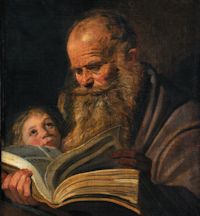St. Matthew is known to us principally as an Evangelist, with his Gospel being the first in the New Testament. His Gospel was written in Aramaic, the language that our Lord Himself spoke and was written to convince the Jews that their anticipated Messiah had come in the person of Jesus.
 No one was more shunned by the Jews than a publican, who was a Jew working for the Roman enemy by robbing his own people and making a large personal profit. Publicans were not allowed to trade, eat, or even pray with others Jews.
No one was more shunned by the Jews than a publican, who was a Jew working for the Roman enemy by robbing his own people and making a large personal profit. Publicans were not allowed to trade, eat, or even pray with others Jews.
One day, while seated at his table of books and money, Jesus looked at Matthew and said two words: "Follow me." This was all that was needed to make Matthew rise, leaving his pieces of silver to follow Christ. His original name, "Levi," in Hebrew signifies "Adhesion" while his new name in Christ, Matthew, means "Gift of God." The only other outstanding mention of Matthew in the Gospels is the dinner party for Christ and His companions to which he invited his fellow tax-collectors. The Jews were surprised to see Jesus with a publican, but Jesus explained that he had come "not to call the just, but sinners."
Not much else is known about Matthew. According to tradition, he preached in Egypt and Ethiopia and further places East. Some legends say he lived until his nineties, dying a peaceful death, others say he died a martyr's death.
In the traditional symbolization of the evangelists, based on Ezech. 1:5-10 and Rev. 4:6-7, the image of the winged man is accorded to Matthew because his Gospel begins with the human genealogy of Christ.
Patron: Accountants; bankers; bookkeepers; customs officers; security guards; stock brokers; tax collectors; Salerno, Italy.
Symbols: Angel holding a pen or inkwell; bag of coins; loose coins; halberd; inkwell; king; lance; man holding money; man holding money box and/or glasses; money bag; money box; purse; spear; sword; winged man; young man; book; man sitting at a desk.








%20Virgin%20and%20Martyr.jpeg)